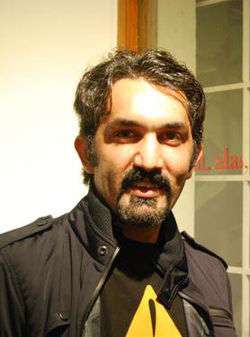Hasnat Mehmood

| Hasnat Mehmood | |
|---|---|
| Born | Jhelum, Pakistan |
| Nationality | Pakistani |
| Occupation | Artist |
Hasnat Mehmood [ Urdu: حسنات محمود ] is a visual artist who lives and works in Lahore, Pakistan. He was born on 3 March 1978 in Jhelum.
Art career
Hasnat Mehmood was trained as a traditional miniature painter from National College of Arts, but in his enthusiastic search for a new language in his art, he transformed the traditional practice into contemporary dialogue. He is a highly progressive, radical artist. Hasnat Mehmood creates contemporary art about a technique that is considered to be a traditional practice. Miniature painting is thought to be the cultural heritage of Pakistan; as such it should remain recognisable as it was practised in the past. For "purists", the experiments that Hasnat and others take in their approaches to miniature painting render the work to be anything but a miniature painting.
Earlier work
I Love Miniature explores a number of these issues related to the miniature painting movement as it has evolved in Pakistan in the last two decades. In it, Hasnat copied the works of thirteen artists who work in this medium – Shahzia Sikander is perhaps the best-known practitioner of miniature painting in the global contemporary art world. By copying their imagery, Hasnat acknowledges and accepts the criticism of miniature painting that it is simply about copying.[1]
"Mona Lisa in Braille" expands this discussion to what is arguably the most famous work of art. So many of us might believe we know the details of this image. However, Hasnat explores how we do not look at things objectively, despite having perfect vision. We come to a work of art with an entire network of ideas, opinions, and experiences. It is a system of understanding that frames our vision. In the work, the artist includes a description of Mona Lisa that appears on the Louvre Museum's website. It is the official interpretation, but it might not be what any of the painting's millions of viewers see when they look at it. Next to this text in Braille appears a print of the work, on top of which is the title, medium, and dimensions; the label for the artwork is integral to our experience of viewing art in an institution.[1]
Recent work
Quddus Mirza wrote of his work: "Mehmood has ventured into another realm and can be labelled as a conceptual miniaturist."[2]
Yee-wan Koon described Holy land and I Love Miniature: "Hasnat Mehmood is perhaps the best known of the three artists and his works have been shown in galleries across the globe. The two main works in the show are formed by painstakingly painted circles that collectively read in Braille sequence, "Holy Land" and " I Love Miniature".…We are reminded of the paradoxical idea that Orhan Pamuk introduced about reaching the height of aesthetic achievement through blindness. But it is the viewer who is rendered blind, at least metaphorically... "[3]
On his recent work “The Inquiry of Art” artist stated that: “The body of work produced for this show is an investigation of the very basics of Pakistani art in the present times...I think that art has never been an individual’s effort only; it has always been produced according to the times in which the artist lives. These portraits articulate this phenomenon because viewers will find a cross listing of writers, etc. from one portrait to the next, indicating a specificity of time and place.[4]
Hasnat has been exploring a sort of conceptual art within the aesthetics of miniature painting. ...The subtlety in constructing portraits of personalities close to him (beginning from his wife to colleagues to friends to fellow artists) is a sign of his conceptual twist—rather than just a transformation from being a miniature artist—and a venture into something exciting and exquisite.[5]
Solo exhibitions
- 2011: The Inquiry of Art
- 2008: Original Image May Vary, Chawkandi Gallery, Karachi
- 2009: I Love Miniature, Aicon Gallery, New York
- 2010: Saloon, Rohtas 2 Gallery, Lahore
Selected group exhibitions
2010
2007
- Lahore Lovelies, Aicon Gallery, London
2006
- Between Two Worlds; Group show at Crow-eaters Gallery, Lahore
- Beyond The Page: Contemporary Art from Pakistan, Group show at Asia House and Manchester Art Gallery, UK
- Partitions: Contemporary Art from India and Pakistan, Group show at HNTB Architecture, Washington D.C.
- Lila/Play: Contemporary Miniatures & New Art from South Asia, Australia
- Landscape: Places real and imagined, Group show at Alhamra Gallery, Lahore
2005
- The Artist's Face, Self-Portraits of our Times, Gallery Rohtas 2, Lahore
- Contemporary Miniatures, Crow-eaters Gallery, Lahore
- Karkhana, A Contemporary Collaboration, Aldrich Museum of Contemporary Art, CT, USA (Exhibition would be travelling to Asian Art Museum)
- Voices, World Bank Office, Islamabad
2004
- Contemporary Miniatures from Pakistan, Fukuoka Asian Art Museum, Japan
- Playing with a Loaded Gun, Kunsthalle Fridericianum, Kassel
2003
- Karkhana, Touchstones Art Gallery, Rochdale, UK
- Contemporary Miniatures from Pakistan, K3 – Project Space, Zurich
- Playing with a Loaded Gun, Apexart, New York (catalogue)
- Miniatures Pakistanaises, Masion d'Art Contemporain Chaillioux, Fresnes, France (Catalogue)
- New Voices, Canvas Gallery, Karachi
- Around Miniature, Chawkandi Art, Karachi
2002
- Paintings from Pakistan, Niavaran Gallery, Tehran
Collections
- British Museum, London UK (Acquired for contemporary landscape section)
- Virginia Whiles, Curator and Art Historian
- Salima Hashmi, Dean of BNU, School of Visual Arts, Lahore
References
- 1 2 Atteqa Ali
- ↑ http://www.jang.com.pk/thenews/feb2010-weekly/nos-14-02-2010/enc.htm#3
- ↑ Yee-Wan Koon, Blindness and Insight, MUSE , February 2010, Hong Kong
- ↑ http://poppyseedgallery.wordpress.com/2011/02/28/the-inquiry-of-art-a-solo-by-hasnat-mehmood/
- ↑ http://www.jang.com.pk/thenews/mar2011-weekly/nos-13-03-2011/enc.htm#2
Further links
- www.whitneyferrare.com/The-Havelian-Express
- www.aicongallery.com/artists/hasnat-mehmood/
- "Hasnat Mehmood" at Poppyseedgallery.wordpress.com
- "BBC News | Blair confronts art close to home" at News.bbc.co.uk
- www.saatchionline.com/art/Photography-Digital-all-were.../view
- universes-in-universe.org/eng/nafas/articles/.../02_hasnat_mehmood
- www.canvasartgallery.net/xhtml/artists/Mehmood%20Hasnat.html
- jang.com.pk/thenews/feb2010-weekly/nos-14-02-2010/enc.htm
- twelvegatesgallery.com/%23new1artist.php?id=1028
- http://culturecatch.com/art/debanjan-roy-hasnat-mehmood-aicon-gallery